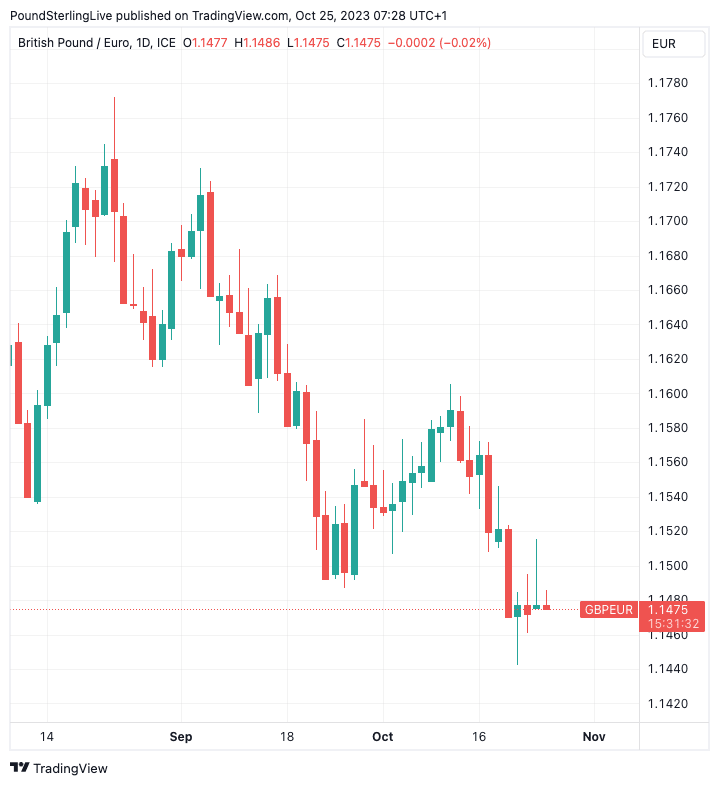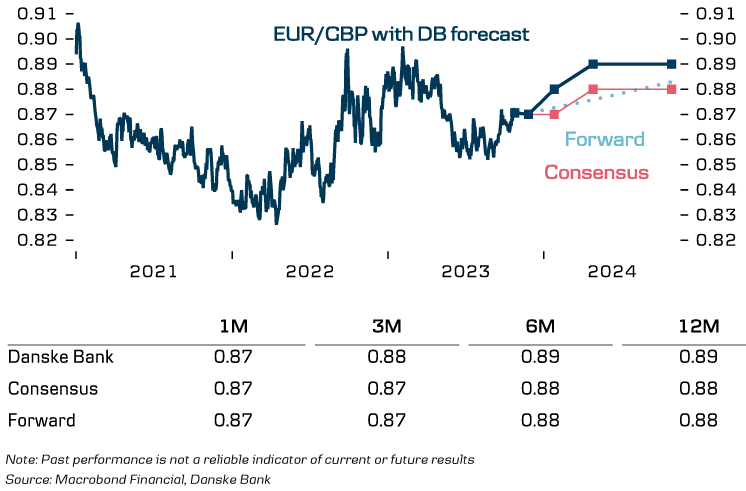Danske Bank Lowers GBP/EUR Forecast
- Written by: Gary Howes

Image © Adobe Image
The Pound to Euro exchange rate (GBPEUR) is destined for lower levels according to new research from a leading Scandinavian bank that envisages a world in which the Eurozone economy outperforms that of the UK.
"We expect the UK economy to perform relatively worse than the euro area and the conclusion of the Bank of England hiking cycle to weigh on GBP," says Kirstine Kundby-Nielsen, an analyst at Danske Bank.
Danske Bank notes the UK unemployment rate has increased to 4.2% from lows of 3.5%, while retail sales and GDP growth remain muted.
Inflation data has also fallen, prompting the Bank of England to say in September that it would keep interest rates unchanged at 5.25%.
"We expect this to mark the peak in the Bank Rate. This is slightly below current market pricing, which is pricing a peak at 5.40%," says Kundby-Nielsen.
Compare Currency Exchange Rates
Find out how much you could save on your international transfer
Estimated saving compared to high street banks:
£2,500.00
Free • No obligation • Takes 2 minutes
The Pound was at one stage the best-performing major currency of 2023, but this outperformance relied on a market assumption that Bank Rate would rise as high as 6.5%.
The crashing to earth of these elevated expectations - courtesy of softening data - has coincided with the softer Pound of recent weeks.
"On balance, we continue to see relative rates as a moderate positive for EUR/GBP," says Kundby-Nielsen. "With the dovish commentary from the BoE and UK data broadly coming in softer than expected, this has acted as a headwind for GBP."
Above: GBPEUR rallied following news UK PMIs outperformed those of the Eurozone. But the failure to hold gains is a red flag and suggests that this pair is under pressure, regardless of the data. Set up a daily rate alert email to track your exchange rate OR set an alert for when your ideal exchange rate is triggered ➡ find out more.
The Eurozone is meanwhile tipped to see "a slight rebound in the struggling manufacturing sector", which is linked to a "bottoming out of China pessimism".
Predictions for Eurozone outperformance relative to the UK leave Danske Bank forecasting the Euro-Pound exchange rate at 0.88 in three months, 0.89 in six months and 0.89 in twelve months. This gives a Pound-Euro exchange rate forecast profile of 1.1360 and 1.1236.
"We lift our forecast profile for EUR/GBP slightly higher to 0.89 over the coming 12 months in light of the higher spot," says Kundby-Nielsen.
But the exchange rate would overshoot these downside targets if global investor sentiment deteriorates, resulting in a "sharp sell-off in risk, where capital inflows dry out and liquidity becomes scarce," says Kundby-Nielsen.
Danske Bank's forecast for the Eurozone to outperform the UK is challenged by survey data for October, suggesting the opposite is currently playing out, with the UK apparently outperforming the Eurozone.
The October composite PMI for the Eurozone read at 46.5 in October, which was down on 47.2 for September and the 47.4 expected by the market. By contrast, the UK reported a headline composite PMI of 48.6, a sliver off the 48.7 expected and up on 48.5 previously reported.
"Markets are taking the release at face value, resulting in a modest uptick in the pound, particularly against the euro, as the UK’s relatively better growth outlook leads sterling to outperform," says Nick Rees, FX Market Analyst at Monex Europe.
"Whilst this outperformance is not unexpected, especially given with real wages having turned positive which should in turn support UK consumer demand, it is welcome given signs that the UK's inflation outlook is also broadly improving in response to the BoE's monetary tightening," adds Rees.
The PMI reports come just days ahead of the European Central Bank (ECB) interest rate decision, due Thursday, and that of the Bank of England, due November 02.
Both central banks are now anticipated to hold interest rates at current levels, the risk for either the Euro or Pound is how their respective central bank communicates future policy decisions.
"The October PMI report strengthens our expectations that ECB hikes are over as the transmission of monetary policy is increasingly being felt by the real economy," says Tullia Bucco, Economist at UniCredit. "There are increasing signs that weakness in economic activity is spilling over to the labour market."
The Pound has fallen 2.50% against the Euro from its August highs but it could form a base if the ECB undermines the Euro by signalling clearly that no further interest rate hikes are likely, owing to softer data.
The same risk faces the Pound next Thursday. However, the Bank of England will likely keep alive the prospect of a December rate hike as insurance against wages continuing to remain elevated by historical measures.
This can limit any Pound Sterling selloff.
Compare Currency Exchange Rates
Find out how much you could save on your international transfer
Estimated saving compared to high street banks:
£2,500.00
Free • No obligation • Takes 2 minutes






